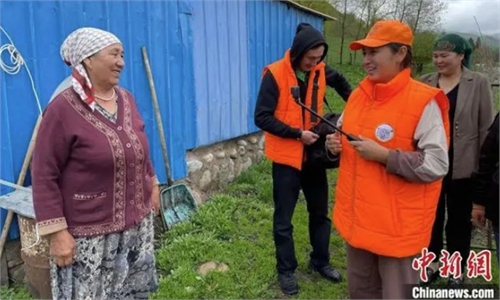
Blossoms Shanghai Photo: Courtesy of Tencent video
It is Chinese Hong Kong director Wong Kar-wai's first television series as well as his first encounter with the Mao Dun Literature Prize, a heavy weight literature awards in China named after the renowned writer Mao Dun.Airing on China Central TV and streaming giant Tencent Video since December 27, 2023, Blossoms Shanghai, the maiden TV series by well-known Hong Kong film director Wong Kar-wai, has become one of the most-widely talked about shows of the New Year holiday period.
The 30-episode period drama, six years in the making, is adapted from the 2012 novel of the same title by Jin Yucheng. Written in Shanghai dialect, the work won the 9th Mao Dun Literature Prize in 2015. It follows the story of Ah Bao (played by Hu Ge in the Wong Kar-wai show) as he goes from nothing to dubious success in the 1990s.
As the most talked-about drama in recent years, Blossoms Shanghai has attracted a lot of attention, not just due to the filmmaker's fast-paced storytelling and quality, but also thanks to the depictions of ordinary people and their vitality under the era of China's reform and opening up dating back to 1990s.
Both the original work and the drama focus on Shanghai in the 1990s as well as the spirit of China during the said decade. For viewers who have not read the original work, Blossoms Shanghai is a slice of life work that allows viewers to understand the fast-developing country at that time as well as the vitality of the people. With the opportunities brought about by the great changes of the times, everyone strives to reach the top.
The TV series version fills in some of the blank spaces in the original work, guiding viewers to seek new answers from it. Together, the two works display and deeply analyze the spirit of China in the 1990s from different angles.
The TV series has also become another example of the cooperation between the Chinese mainland and Hong Kong in terms of films and TV series. China's rich literary treasure trove and resources have inspired more and more international directors such as Wong to tell Chinese stories with their own unique style and through means that are more easily acceptable by global audiences.
The presence of Wong's eye-popping visuals, as well as memorable music and characters that linger long in the memory stays true to the novel's distinctive local flavor, especially through a cast that were all born or raised in Shanghai. Great effort was also made to recreate the look and feel of 1990s Shanghai.

